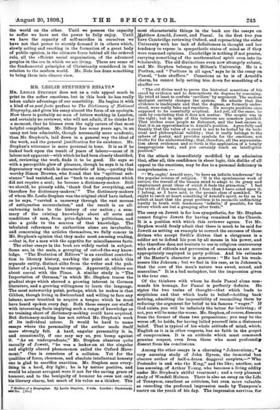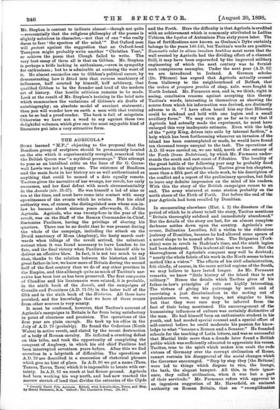MR. LESLIE STEPHEN'S ESSAYS.*
Mn. LESLIE STEPHEN does not as a rule appeal much in print to the softer emotions, but in this book he has really taken unfair advantage of our sensibility. He begins it with a kind of ex post facto preface to The Dictionary of National Biography, and gives his essay almost the form of an apologia. Now there is probably no man of letters working in London, and certainly no reviewer, who will not admit, if he thinks for
a moment, that he blesses even the ugly covers of that most helpful compilation. Mr. Sidney Lee some years ago, in an essay not less admirable, though necessarily more academic, than Mr. Stephen's, laid down in a general way the ideal of the work, and the general justification for its existence. Mr. Stephen's utterance is more personal in tone. It is as if he looked back upon the result of years of labour—most of it labour not apparent—with which he had been closely identified, and, reviewing the work, finds it to be good. He says so with a perceptible glow of pleasure, though he says it in that deprecatory way which is characteristic of him,—quoting the worthy Simon Browne, who found that his "spiritual sub- stance " had vanished, and so "took to an employment which did not require a soul; he became a dictionary-maker. Still we should, he piously adds, 'thank God for everything, and 'therefore for dictionary-makers.'" The dictionary-makers of whom Mr. Leslie Stephen was the original chief have indeed, as he says, "carried a causeway through the vast morass of antiquarian accumulation," and the result is an all- embracing index to the history of our nation ; a sum- mary of the existing knowledge about all sorts and conditions of men, from prize-fighters to politicians, and also a guide to the sources of that knowledge. The tabulated references to authorities alone are invaluable ; and concerning the articles themselves, we fully concur in Mr. Stephen's opinion that they make most amusing reading, —that is, for a man with the appetite for miscellaneous facts.
The other essays in the book are widely varied in subject.
Some are, in the main, a grouping of out-of-the-way know- ledge. " The Evolution of Editors" is an excellent contribu- tion to literary history, marking the point at which this separate entity, distinct alike from the writer and the pub- lisher of a journal, began to emerge. Apparently, editors are about coeval with the Times. A similar study is "The Importation of German," in which Mr. Stephen traces the gradual steps which showed a growing interest in German literature, and a growing willingness to learn the language. The most noteworthy point, perhaps, which he makes is that Gibbon, though living in Switzerland and willing to face any labour, never troubled to acquire a tongue which he must have heard spoken every day. Both these essays are stuffed with interesting facts implying such a range of knowledge as no training short of dictionary-making could have acquired. But dictionary-making has not robbed Mr. Stephen's work of its individual colour. It would be hard to name essays where the personality of the author made itself more strongly felt. A hard, angular personality it is, and occasionally, if one may say so, you bump against it. "As an undergraduate," Mr. Stephen observes quite casually of Jowett, "he was a looker-on at the singular and slightly absurd phenomenon called the Oxford Move- ment." One is conscious of a collision. Yet for the qualities of force, clearness, and absolute intellectual honesty one is glad to sacrifice suavitiee. Mr. Stephen sees every- thing in a hard, dry light ; he is by nature positive, and would be almost. arrogant were it not for the saving grace of humour, and to the benignity of humour he owes not only his literary charm, but much of his value as a thinker. The
Sludiee of a Biographer. By Leslie Stephen. 2 vols. London: Duckworth and Cu, [12s.]
most characteristic things in the book are the essays on Matthew Arnold, Jowett, and Pascal. In the first two you have Cambridge reviewing Oxford, and reproaching the sister University with her lack of definiteness in thought and her tendency to repose in sympathetic states of mind as if they were reasoned opinions. Cambridge is nothing if not precise, carrying something of the mathematical spirit even into its Scholarship. The old distinctions even now strangely subsist, and Mr. Stephen belongs to Milton's University. He is a Puritan, and "Puritans in all ages," says he in the essay on Pascal, "hate shuffiers." Conscious as he is of Arnold's charm, he cannot help setting him down for something of a shuffier
" The old divine used to prove the historical assertions of hie creed by evidence and to demonstrate its dogmas by reasoning. He tried at least to confute cavilers' by argument. The modern apologist entirely changes the system. He admits that the evidence is inadequate and that the dogmas, as formerly under- stood, were really false and repulsive. He accepts positions once supposed to be essentially sceptical. And yet, all the same, he ends by concluding that it does not matter. The sceptic was in the right; but in spite of this believers are somehow justified. That strikes some people as dishonest, and the best excuse is, that it is an approximation to Arnold's position. Agree fully and frankly that the value of a creed is not to be tested by its tech- nical and philosophical validity ; that it really belongs to the sphere of poetry, and provides symbols for the emotions, not truths for the understanding; that, therefore, all the argumenta- tion about evidences and so forth is the application of a totally inappropriate test ; and you certainly reach an intelligible position."
Yet the attack is immediately modified by an admission that, after all, this confidence in sheer logic, this dislike of all appeal to the emotions, may be due to a personal deficiency in comprehension :—
" We ought,' Arnold says, `to have an infinite tenderness' for the popular science of reli<,bion. It is the spontaneous work of nature, the travail of the human mind to adapt to its grasp and employment great ideas of which it feels the attraction.' I feel the truth of this teaching more, I fear, than I have acted upon it I belong, as I have said, to the prosaic class of mankind. We might to catch at heart something of Arnold's spirit, so far as te admit at least that the great problem is to reconcile unflinching loyalty to truth with tenderness infinite,' if possible, for the errors which are but a grasping after truth."
The essay on Jowett is far less sympathetic, for Mr. Stephen cannot forgive Jowett for having remained in the Church.
It is a position with which this reviewer agrees. Yet Mr. Stephen would freely admit that there is much to be said for Jowett as setting an example to correct the excesses of those divines who accept Swift's dictum that a clergyman is a soldier set to defend his post by all means in his power, and who therefore does not hesitate to use in religions controversy such arts of ridicule and perversion of meanings as are more appropriately employed in party politics. And his estimate of the Master's character is generous "He had his weak- nesses like Johnson ; but we feel in his case, as in Johnson's,. that the core of the man's nature was sweet, sound, and masculine." It is a bad metaphor, but the impression given is the true one.
Of the thinkers with whom he deals Pascal alone com- mands his homage, for Pascal is perfectly definite. He states the two trains of thought—that which leads to scepticism and that which leads to belief—holding back nothing, admitting the impossibility of reconciling them by reducing the argument for belief to his famous "wager." If God exists, you will be infinitely the better for believing ; if not, you will be none the worse. Mr. Stephen, of course, dissents from the former of these two propositions ; you may be the worse off, he holds, for having lulled yourself into a dishonest belief. That is typical of his whole attitude of mind, which.
English as it is in other respects, has no faith in the gospel of compromises. It is an attitude which must command genuine respect, even from those who most profoundly dissent from his conclusions.
Among the other essays is a charming " Johnsoniana; " very amusing study of John Byrom, the immortal but obscure author of half-a-dozen doggerel couplets,—" Who Pretender is and who the King," and the like; another, not less amusing, of Arthur Young, who becomes a living oddity under Mr. Stephen's skilful treatment ; and a very pleasant study of Wendell Holmes. There is also an essay on the Life of Tennyson, excellent as criticism, but even more valuable as recording the profound impression made by Tennyson's voetry on the youth of his day. The impression survives, for Mr. Stephen is content to indicate almost—though not quite —reverentially that the religious philosophy of the poems is slightly nebulous in character,—not that of one "who really dares to face 'the spectres of the mind.'" But Oxford man will protest against the suggestion that an Oxford-bred Tennyson might probably write another "Christian Year," or achieve the poem that Clough failed to write. The very best essay of them all is that on Gibbon. Mr. Stephen is perhaps a trifle lacking in enthusiasm,—even in sympathy for enthusiasm ; but he is admirable at excusing the want of it. He almost reconciles one to Gibbon's political career, by demonstrating how it fitted into that curious machinery of influences, half courted by himself, half arbitrary, that qualified Gibbon to be the founder and head of the modern art of history. One hostile criticism remains to be made. Look at the result of Mr. Stephen's training in the brief note which summarises the variations of Gibbon's six drafts of autobiography; an absolute model of succinct statement ; then you will wonder how on earth a man with that training ean be so bad a proof-reader. The book is full of misprints. Otherwise we have not a word to say against these two delightful volumes, which give one the most enjoyable kind of Literature put into a very attractive form.



































 Previous page
Previous page